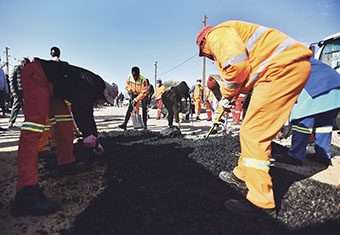On May 29, South Africans went to the polls to renew our constitutional democracy based on the will of the people and rule of law. For the first time since 1994, there was no outright winner in the national elections and this situation required political parties to negotiate among themselves on the formation of the seventh administration.
The government of national unity (GNU) presents a unique opportunity to build on the gains made since 1994 by ensuring collaboration across diverse political parties. This unity allows for a more inclusive approach to governance and multiple perspectives are considered in decision-making informed by the statement of intent, which finds it expression in the State of the Nation address, a profound government policy statement that sets the trajectory for socio-economic development.
Working through the GNU, South Africa will be working to, for example, expand services to meet the basic needs of the people, particularly the majority, who had been deliberately denied by apartheid governments.
In the past, basic services were provided based on race and black people were excluded. In 1994, 12-million people had no access to safe drinking water, 17-million lived below the poverty line while 21-million had no adequate sanitation. About 2-million were subjected to using the bucket system which was a stark violation of the right to dignity and unhygienic.
The urban housing backlog in 1990 was conservatively estimated at 1.3-million units. Including hostels and rural areas, the backlog rose to approximately 3-million units.
Our villages and townships were almost pitch dark at night as there was non-existent or inadequate street lighting. Most people also used open fires and coal stoves and that led to high levels of sulphur dioxide, which adversely affected the health of many people.
To uplift the material condition of the people, the democratically elected government implemented the Reconstruction and Development Programme to address and prioritise the provision of the basic needs of people such as water, electricity, housing and sanitation.
Today, South Africa is a vastly different place compared to what it was in 1994.
Key progress is reflected in the Census 2022, with the number of households in the country having almost doubled from 9,1-million in 1996 to 17,8-million in 2022. In 2022, almost 29,9% of households resided in a government-subsidised dwelling or RDP house while over 82,4% of households had access to piped water either inside their dwelling or inside their yard.
In 2022, approximately 66,3% of households in the country had their refuse removed by a local authority once a week, as opposed to 52% in 1996.
About 13,7-million people have been provided with homes through various social housing programmes from 1994 to 2022. In 2022, 83.2% of households had access to improved sanitation services while those using electricity as the main source of energy for lighting increased from 58,1% in 1996 to 94,7% in 2022.
Another important intervention was to allow households who cannot afford municipal services access to free basic services through the municipal indigent policy. Through this policy, every poor household receives a minimum standard of basic services such as six kilolitres of water and 50kW of electricity monthly.
This free basic services programme c supports more than 3.5-million indigent households and reduces the burden of household labour and brings about relief to poor households who experience a lower quality of life. It also ensures that no citizen is denied the right to basic services, regardless of their ability to pay.
As we reflect on the progress we’ve made since 1994, it’s equally important to acknowledge the challenges we face, including the lingering issues inherited from our past, even 30 years into our democracy.
To build on our achievements, we must unite as a nation. Every South African has a role to play in shaping our future. In line with the district development model, we need collaboration across all sectors – government, business, and civil society – to drive economic growth, create jobs and foster hope for a better tomorrow.
- Dr Masemola is the deputy minister of cooperative governance and traditional affairs





